Template File: /www/wp-content/themes/stn2017/index.php | Template Hierarchy
WP version: 6.4.4
PHP version 8.2.17
A 2-hour online learning event “What is frailty and why do we care?” was hosted by the STN on 9th October.
Subject matter experts from across the network presented background information, data and case studies on frailty and its impact on major trauma. There were discussions about frailty scoring, current frailty provision and findings from quality improvement work in NHS Lanarkshire.
133 people attended the event on MS Teams from all the Scottish regional trauma networks and from across many different professions. Feedback showed the event was highly valued.
If anyone has any ideas for a similar event on any subject around major trauma the STN team will support you.
What is it?
HECTOR began as the Heartlands Elderly Care Trauma and Ongoing Recovery course that was established to develop a training programme for clinicians and practitioners who are responsible for looking after older people who have injuries.
These injuries that an individual sustains often play second fiddle to the complex comorbidities, frailty, and the challenges of caring for them within an ever-pressured emergency care system.
This course is a two day course covering the assessment and management of elderly patients involved in trauma, and their first 48-72 hours in hospital. The course takes a mixed approach to education – with lectures, discussion groups and practical moulage stations. As a participant you’d be involved in all of these areas and would be split into mixed specialty/discipline groups for the small group work.
Who is it for?
Healthcare professionals working with elderly people in the first 24-72 hours after sustaining traumatic injury either as part of the initial assessment or the early stages of rehabilitation.
Previous course participants have included advanced physiotherapists, occupational therapists, consultants and registrars in emergency medicine, geriatric medicine, general surgery and orthopaedics; general practitioners and prehospital responders; major trauma coordinators; nurses working with trauma patients; paramedics and rehabilitation staff.
Who is running it?
An interspecialty and multidisciplinary faculty from the Scottish (STN) and Northern Trauma Network England (NTN). The NTN have kindly supported the setting up of this course.
When is it?
There will be selected dates across the year – however if you apply (see below) then you will be informed when you are at the top of the waiting list, of when the next courses are available.
How do I apply?
Click this link or scan the QR code: HECTOR Application Form
If the link doesn’t work, then please email fv.hectorcourse@nhs.scot for an application form.
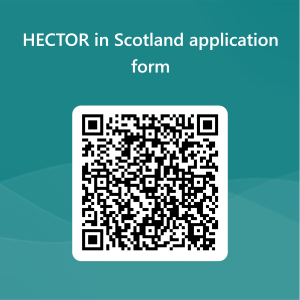
Cost:
£350 for doctors, £200 for NMAHPs.
The difference in price is based on availability of study budgets for non-mandatory courses between staff groups.
Any questions, then email the centre fv.hectorcourse@nhs.scot
Many thanks,
Joel, Claire, Jon and Sarah (HECTOR Scotland faculty)
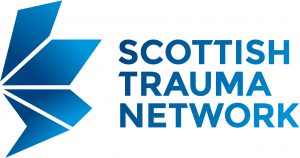



The Scottish Trauma Network (STN) are pleased to announce the Healthcare Support Worker (HCSW) Nursing, Midwifery and Allied Health Professions (NMAHP) Development Framework for Major Trauma is now published.

The framework is hosted on the STN website and can be found at the link below
https://scottishtraumanetwork.com/our-work/education-learning/
The framework will be used by HCSW NMAHP practitioners caring for major trauma patients in any in-hospital in for identifying, planning and supporting learning needs, identifying career pathways and enhancing workforce planning.
This framework is the result of collaborative working between NHS Education for Scotland (NES) and the STN, working closely with HCSW NMAHP practitioners and consulting with the STN Education and Workforce group. It provides specialist content and is a “bolt-on” to the already published NES HCSW NMAHP Education and Development Framework which should be referred to first for detail of four pillars of practice, guidance on how to use the framework and information on accountability and delegation.
This completes the STN’s objective of having a development framework for all NMAHP roles in major trauma. Next steps are to strengthen implementation and gather feedback.
The first Scottish cohort of the silver trauma course HECTOR was delivered at Scottish Centre for Simulation and Clinical Human Factors (SCSCHF) on the 20th and 21st March.
The 15 participants were from mixed professions including care of the elderly and frailty medicine, GPs, advanced practitioners from nursing and allied health professions and major trauma co-ordinators. All the Scottish regional trauma networks were represented
The Hector faculty from the Northern Trauma Network in England travelled to Scotland to facilitate the programme alongside Dr Joel Burton and other STN colleagues.
It was a busy 2 days filled with simulated scenarios to practice assessment and decision-making skills with supportive materials and discussion.
There was lots of positive energy and initial feedback from the participants was that they valued the course content, approach and learning from each other. Next steps are formal evaluation and to grow the Scottish faculty for the next cohort
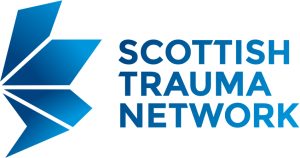 .
.


The Scottish Trauma Network (STN) are pleased to announce the publication of the Nursing, Midwifery and Allied Health Professions (NMAHP) NMAHP Development Framework for Major Trauma.
This is hosted within the Education and Training section of the STN website;
https://www.scottishtraumanetwork.com/our-work/education-learning/
The NMAHP Development Framework for Major Trauma will be used by NMAHP practitioners caring for major trauma patients in any in-hospital setting at local, regional and national levels for identifying, planning and supporting learning needs, identifying career pathways and enhancing workforce planning.
This framework is the result of collaborative working between NHS Education for Scotland (NES) and the STN, working closely with NMAHP practitioners and consulting with the STN Education and Workforce group. It is aligned to the already published NES NMAHP Development Framework.
It is currently for registered practitioners at education levels 5-8 with the Healthcare Support Worker element following later in the year, in conjunction with the national HCSW commission.
Introduction by National Clinical Lead
Annual report time arrives once again, and in this new style of presentation my superlatives for the work of all who support the continued work, development and improvements of the Scottish Trauma Network will be brief. This is just as well, as the resources of my thesaurus begin to abate.
It is now 5 years since we convened and commenced our program of work to build and implement an entirely new clinical network of acute care and long-term rehabilitation for Scotland’s most seriously injured. August 30th 2021 witnessed the completion of Phase I with delivery of the fully operational end product. At time of writing, we run smoothly and successfully in the best traditions of “National Collaborative Pragmatism”.
All of this achieved of course, against the backdrop of complications presented to us by the pandemic. A remarkable achievement now recognised and acclaimed at the highest levels of the NHS, the Scottish Government, and national and international media.
This hard-earned and well-deserved reputation requires stiffening of the sinews and strengthening of resolve to be maintained, for us to progress further as we contribute well beyond our remit to the Remobilisation of the NHS in Scotland.
Thus, now begins Phase II, where we plan to tell the story using data, to raise standards for the future, and to demonstrate the sustained improved outcomes for patients, their families, their communities and the nation as a return on the visionary investment of these past 5 years.
The full report can be seen here
Martin McKechnie
National Clinical Lead
Scottish Trauma Network
The eighth report by the Scottish Trauma Audit Group (STAG) since 2011 can be found on the Public Health Scotland website. Compliance with a subset of the Scottish Trauma Network Key Performance Indicators, case-mix adjusted mortality and Patient Reported Outcome Measures (PROMs) are within part one of the report. Part two and three provide a comprehensive summary of injuries and the patient journey for both adults and paediatrics respectively.
Introduction from National Clinical Lead
2020 – 21 has been variously difficult, challenging, interesting and rewarding across the many spheres of activity, development and progress for the Scottish Trauma Network (STN). This Annual Report sits alongside and complements the imminent publication of the Scottish Trauma Audit Group’s (STAG) Annual Report for the same period. They both reveal and explore much of the data, operational and patient-centred clinical stories around this past year’s extraordinary activity within the Network. Set against the pandemic backdrop, the strong message coming from these reports is one of resilience, maintained high-quality patient care and an above-and-beyond spirit of collaboration and pragmatism on a national scale. That key performance and outcome measures have been delivered, yet alone maintained and improved in several areas, is worthy of acknowledgment and appreciation. The reports further explore much of our presentation and discussion at the Scottish Parliament Health and Sport Select Committee in January 2021.
There are many examples to celebrate, but I take this opportunity to highlight and express admiration and gratitude to the Scottish Ambulance Service, the ScotSTAR and EMRS transport and retrieval arms, and the newer Advanced Paramedics in Critical Care red teams therein. Their relentless and complex work in supporting and enabling the pandemic response across trauma and all related critical care services has been inspiring. The STN and patients are thankful to them beyond words. These thanks are expressed in equal measure to all staff and services recruited in good faith and optimism to the STN, yet who found themselves redeployed and reallocated to support the response in other vital areas such as Emergency Departments, Trauma Wards which became Covid High Dependency Units and Critical Care areas, and Theatres.
More interesting still is what much of this tells us about the improved access we now have to data and patient-reported measures. These are the mainstays of why the STN does what it does. With STN Trauma and STAG coordinators now embedded in our hospitals, we are able to reach more broadly across and deeper into the care of trauma patients than ever before. The resulting information and its analysis will further “tell the story” as we move beyond delivery of Phase I later this year, with the opening of the Major Trauma Centres at the Queen Elizabeth University Hospital in Glasgow, and the Royal Infirmary of Edinburgh, and the operational delivery of the Regional Networks in the West and South East of Scotland. These final pieces of the jigsaw will complete the national picture alongside the MTCs at Aberdeen Royal Infirmary and Ninewells Hospital in Dundee opened in 2018, supporting all the component services within our Regional Networks.
It is to be hoped that by the time of next year’s report we will be able to reflect upon a time of challenge and change with a more secure feel for what the immediate and medium-term future holds for our service. This learning allows us to reenergise and reconvene with strength, determination and the confidence that comes from surmounting such a significant hurdle.
Every person and every collaborative and linked service involved, described and embraced within the following pages is deserving of the greatest of gratitude and recognition. We are indebted to you all.
The full report can be seen here.
Martin McKechnie
National Clinical Lead
Scottish Trauma Network
Paediatric Tele-education
BASICs are running a online course aimed at emergency medicine professionals and running 12 weeks, starting on Tuesday 7th April 2020. A new lesson is released every week and each weekly lesson will contain a pre-recorded presentation by specialty doctor in emergency medicine Karyn Webster. The pre-recorded presentations are available on BASICS e-learning site, along with useful resources such as documentation website links and a weekly quiz. Each student will gain access to the course commences.
Topics covered;
Course Cost – £150 for non-members/£135 for BASICS Scotland members.
For further information and to apply, please click here. Closing date for applications is Monday 31st March 2020.
The second annual Scottish Trauma Network (STN) conference took place in Edinburgh on 26 and 27 June 2019.
The event showcased and celebrated innovation and collaboration in the development of Scotland’s new trauma system – designed to deliver the highest quality of integrated, multi-speciality care for severely injured patients.
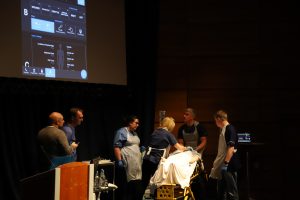
A demonstration of Scotland’s new trauma app
The new approach to trauma care was described by Jeane Freeman, Cabinet Secretary for Health and Sport in her opening address as: “An exemplar piece of work and a structure are evolving across the country, thanks to the innovative work of the Scottish Trauma Network (STN).”
Speakers across the two day event included Malcolm Wright, Chief Executive, NHSScotland and Professor Mansoor Ali Khan, Surgeon Commander in the Royal Navy and Consultant Trauma Surgeon, from North West London Major Trauma Centre. Professor Richard William OBE, University of South Wales spoke about psychosocial care for casualties following major incidents and Naomi Davis, Associate Medical Director, Royal Manchester Children’s Hospital talked about the Manchester Arena attack in 2017 and the paediatric services two years on.
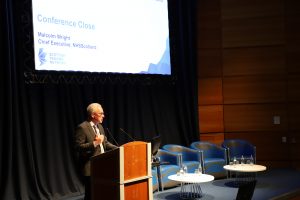
Malcolm Wright, Chief Executive, NHSScotland
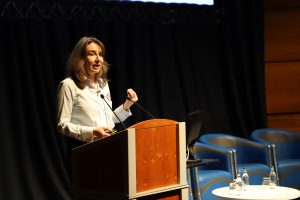
Naomi Davis, Associate Medical Director, Royal Manchester Children’s Hospital
The event also saw the launch of the revised Major Incident and Mass Casualty Plan which was described by Ray De Souza, Depute Head, Scottish Government Health Resilience Unit as “a ‘concept’ of operations rather than a plan”. Its aim is to remove the anxiety of decision making from responders by providing the crucial reassurance to their teams that they are supported in the role that they play.
The plan, which is to be ready for implementation across Scotland by 1 September 2019, draws on learning from large scale incidents in recent years, with particular focus on the needs of children and the importance of psychosocial as well as physical care.
Reflecting on the success of the annual event, Dr Martin McKechnie, STN National Clinical Director commented: “This event has captured the huge amount of progress that is being made by all members within the broad and expanding STN. We are all now looking ahead to future developments presenting even more potential opportunities. Thank you to all our members for their continued support and energy which drives us forward.”
To find out more about STN developments, click here.